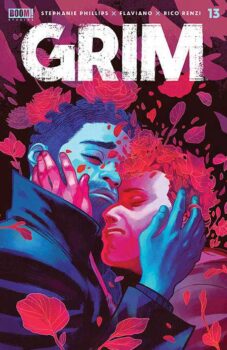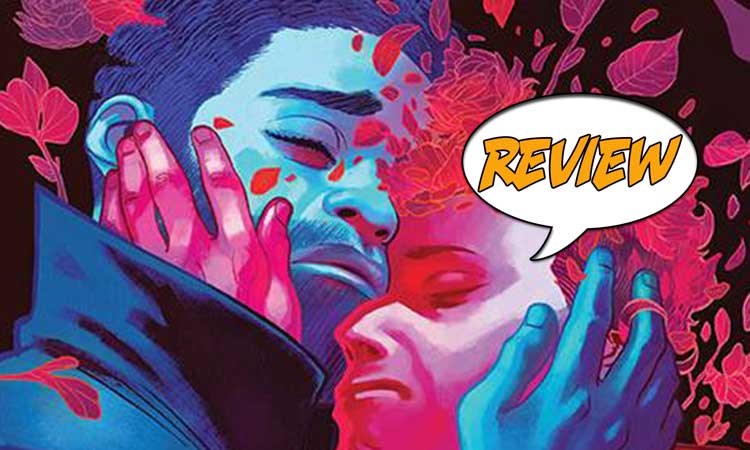Marcel has left the main story, but he still has a story of his own. What is the story behind the death of his lover? Find out in Grim #13 from BOOM! Studios.

GRIM #13
Writer: Stephanie Phillips
Artist: Flaviano
Colorist: Rico Renzi
Letterer: Tom Napolitano
Editor: Eric Harburn
Publisher: BOOM! Studios
Cover Price: $3.99
Release Date: September 20, 2023
Previously in Grim: Death is gone, and people are no longer dying. Life tries to get Lilah’s amulet, but she will not give it up willingly. Adira visits Jess and Eddie in their current prison, asks for their help, and drops Death’s scythe at Jess’s feet. Jess refuses to pick it up, but the scythe cracks the dome of the prison, letting in the River Styx. Jess is surrounded by souls who proclaim her to be the Grim Reaper. Jess grabs the scythe, and it transports her and Eddie to a picturesque European village that is overrun with small demons.
LOVE AND DEATH IN PARIS
Grim #13 is a change in pace, an interlude, a chance to see Marcel’s story. It opens with Marcel and his lover Henri in 1898 at the Cabaret du Néant in Paris, a restaurant with a death theme (and a real place). Marcel finds it tawdry. Henri scolds him and says it is supposed to be fun. Marcel also finds it tasteless that they are performing Shakespeare in such a setting. Then we get to the point about Marcel. Henri makes a barbed comment about how if Marcel ever finishes his script, he can decorate the theatre however he wants.
Marcel writes but has writer’s block. Henri was hoping not only to spend some time with him and have some fun, but also to inspire him so he can find his creative spark. Marcel turns on him, claiming to write about love, about pain, about the human experience. He turns to walk out but a hooded man suddenly insists that he and Henri are volunteers. He is bringing their souls up for judgment. The hooded man, now looking like Henri, offers Marcel a deal. He knows that, deep in his heart, Marcel would trade anything to become the successful writer he imagines himself to be. Would he give up Henri?
The scene changes. In the small apartment, he shares with Marcel, an emaciated Henri coughs up blood. Marcel walks in to tell him he must go to the store to buy more paper, and that he has figured out how to write his next scene. He feels this play will finally be a success, and he has dreams of their future. He walks out, plainly not seeing that Henri is terribly sick, dying of TB in echoes of many a 19th-century tragedy.
The hooded Henri points out to the Marcel of the main story that he was willing to sacrifice his love for his work. Marcel admits he did not realize Henri was so sick. Then Henri reminds him that he killed him. While the knife may have struck the final blow, his selfishness beforehand is what led to his lover’s death. Marcel apologizes, but it is too late. Henri is long since gone. The hooded man is not him.
Slowly we must realize that this is what Marcel is facing in Hell. Henri loved him, yet he was at fault for his lover’s death, directly and indirectly. He wanted to write about life and love and truth yet could not see the truth in his own life and love. Marcel claims he could not live without Henri. Henri counters that Marcel could no longer live with himself.
HISTORY OR MEMORY?
The art of Grim #13 helps the story feel somewhat unsettling. As it opens, it feels like a straight visit to Marcel’s past. The atmosphere of the dark cabaret is captured succinctly, and then the reddish tones help remind us of the color scheme of the afterlife. In this world of reds and shadows, Henri stands out. He wears a white shirt with a loose white cravat. In a place with death as a theme, he is brightly alive. Marcel’s story parallels the theme of the main story.
When Marcel leaves but instead finds himself on stage with Henri, the story feels more dreamlike. When the hooded man, who simply looks skeletal at first, turns into Henri, I momentarily lost track of what was happening. But then I remembered that Marcel had been dragged into Hell. Perhaps revisiting his life is the torture he faces now. His tragedy feels personal and intimate, yet the way it leans on 19th-century tragedic tropes also makes it feel grandly theatrical.
BOTTOM LINE: MARCEL’S PERSONAL HELL
Grim #13 shows is there is a lot of room to explore the afterlife in the world of this story. I like having the opportunity to find out more about Marcel and his story.
Grim #13
Marcel has been haunted by his past – and now he must revisit it face to face!
-
Writing8
-
Art8
-
Coloring8



